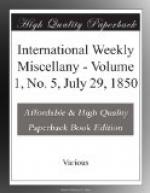“With the exception of the patriarchal family of the Rostand, that great house of ship-owners, which linked Smyrna, Athens, Syria and Egypt to France by their various enterprises, and to whom I had been indebted for all the pleasures of my first voyage to the East; with the exception of M. Miege, the general agent of all our maritime diplomacy in the Mediterranean, with the exception of Joseph Autran, that oriental poet who refuses to quit his native region because he prefers his natural elements to glory, I knew but few persons at Marseilles. I wished to make no acquaintances and sought isolation and leisure, leisure and study. I wrote the history of one revolution, without a suspicion that the spirit of another convulsion looked over my shoulder, hurrying me from the half finished page, to participate not with the pen, but manually, in another of the great Dramas of France.
“Marseilles is however hospitable as its sea, its port, and its climate. A beautiful nature there expands the heart. Where heaven smiles man also is tempted to be mirthful. Scarcely had I fixed myself in the faubourg, when the men of letters, of politics,—the merchants who had proposed great objects to themselves, and who entertained extended views; the youth, in the ears of whom yet dwelt the echoes of my old poems; the men who lived by the labor of their own hands, many of whom however write, study, sing, and make verses, come to my retreat, bringing with them, however, that delicate reserve which is the modesty and grace of hospitality. I received pleasure without any annoyances from this hospitality and attention. I devoted my mornings to study, my days to solitude and to the sea, my evenings to a small number of unknown friends, who came from the city to speak to me of travels, literature, and commerce.
“Commerce at Marseilles is not a matter of paltry traffic, or trifling parsimony and retrenchments of capital. Marseilles looks on all questions of commerce as a dilation and expansion of French capital, and of the raw material exported and imported from Europe and Asia. Commerce at Marseilles is a lucrative diplomacy, at the same time, both local and national. Patriotism animates its enterprises, honor floats with its flag, and policy presides over every departure. Their commerce is one eternal battle, waged on the ocean at their own peril and risk, with those rivals who contend with France for Asia and Africa, and for the purpose of extending the French name and fame over the opposite continents which touch on the Mediterranean.
“One Sunday, after a long excursion on the sea with Madame Lamartine, we were told that a woman, modest and timid in her deportment, had come in the diligence from Aix to Marseilles, and for four or five hours had been waiting for us in a little orange grove next between the villa and the garden. I suffered my wife to go into the house, and passed myself into the orange grove to receive the stranger. I had no acquaintance with any one at Aix, and was utterly ignorant of the motive which could have induced my visitor to wait so long and so patiently for me.




